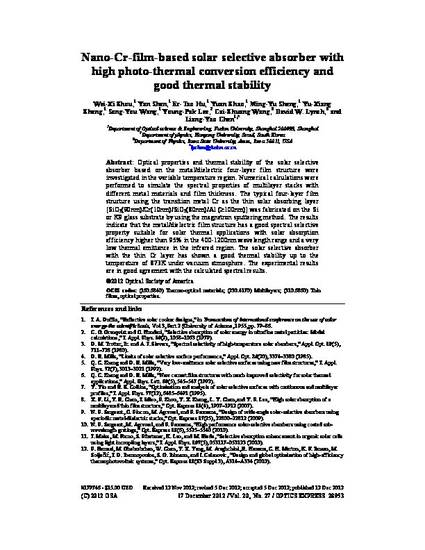
Article
Nano-Cr-film-based solar selective absorber with high photo-thermal conversion efficiency and good thermal stability
Optics Express
Document Type
Article
Disciplines
Publication Date
12-1-2012
DOI
10.1364/OE.20.028953
Abstract
Optical properties and thermal stability of the solar selective absorber based on the metal/dielectric four-layer film structure were investigated in the variable temperature region. Numerical calculations were performed to simulate the spectral properties of multilayer stacks with different metal materials and film thickness. The typical four-layer film structure using the transition metal Cr as the thin solar absorbing layer [SiO2(90nm)/Cr(10nm)/SiO2(80nm)/Al (≥100nm)] was fabricated on the Si or K9 glass substrate by using the magnetron sputtering method. The results indicate that the metal/dielectric film structure has a good spectral selective property suitable for solar thermal applications with solar absorption efficiency higher than 95% in the 400-1200nm wavelength range and a very low thermal emittance in the infrared region. The solar selective absorber with the thin Cr layer has shown a good thermal stability up to the temperature of 873K under vacuum atmosphere. The experimental results are in good agreement with the calculated spectral results.
Copyright Owner
The Optical Society of America
Copyright Date
2012
Language
en
File Format
application/pdf
Citation Information
Wei-Xi Zhou, Yan Shen, Er-Tao Hu, Yuan Zhao, et al.. "Nano-Cr-film-based solar selective absorber with high photo-thermal conversion efficiency and good thermal stability" Optics Express Vol. 20 Iss. 27 (2012) p. 28953 - 28962 Available at: http://works.bepress.com/david_lynch1/123/

This paper was published in Optics Express 20 (2012): 28953 and is made available as an electronic reprint with the permission of OSA. The paper can be found at the following URL on the OSA website: doi:10.1364/OE.20.028953. Systematic or multiple reproduction or distribution to multiple locations via electronic or other means is prohibited and is subject to penalties under law."